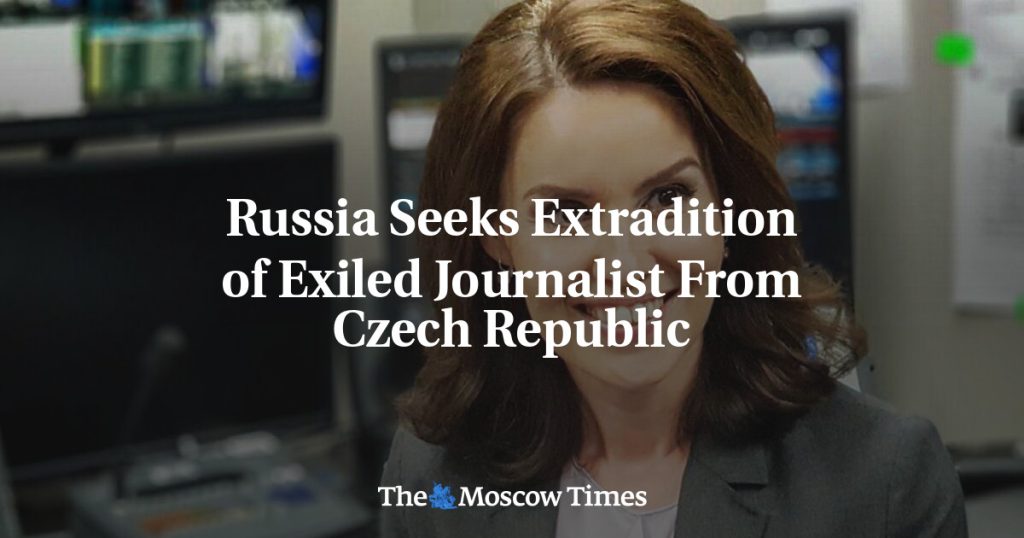The Extradition Request: A Threat to Freedom of Speech
On Monday evening, former Russian state television anchor Farida Kurbangaleeva revealed on social media that Russia’s Prosecutor General’s Office had requested her extradition from the Czech Republic. Kurbangaleeva, who once hosted the Vesti news program on the state-run channel Rossiya 1, left the network in 2014 following Russia’s annexation of Crimea. The extradition request, which Kurbangaleeva posted on Facebook, did not specify the charges against her. However, she believes it is connected to the criminal charges filed against her last summer—one for "justifying terrorism" and another for spreading "false information" about the Russian military. Kurbangaleeva dismissed these charges as fabrications, expressing little concern that the Czech Republic would comply with the request.
A Journey of Resistance
Kurbangaleeva’s exit from Russian state media in 2014 marked the beginning of her resistance to the Kremlin’s increasingly repressive policies. Her decision to leave the network was a bold statement against the annexation of Crimea, a move that many in the international community condemned. In 2018, she joined the Prague-based Russian-language television network Current Time, a project of Radio Free Europe/Radio Liberty (RFE/RL), where she worked until 2021. Her current role with the exiled news outlet Govorit NeMoskva and her YouTube channel have further solidified her commitment to independent journalism. These platforms have become crucial for providing Russian-speaking audiences with accurate, unbiased information, often challenging the narrative promoted by state-controlled media.
The Charges: A Smokescreen for Silencing Dissent
The charges against Kurbangaleeva—justifying terrorism and spreading false information—are increasingly common tools used by the Russian government to silence journalists and critics. These charges are often vague and open to interpretation, allowing authorities to target individuals who express dissenting views or report on sensitive issues. The accusation of justifying terrorism, in particular, is a serious one, often used to intimidate and silence those who challenge the state’s narrative. Similarly, the charge of spreading false information about the military is part of a broader campaign to control the flow of information and suppress critical reporting on Russia’s military actions, both domestically and abroad.
The Czech Republic and the Rule of Law
Kurbangaleeva’s confidence that the Czech Republic will not comply with the extradition request is rooted in the country’s commitment to the rule of law and human rights. The Czech Republic, a member of the European Union, has a history of supporting freedom of speech and protecting journalists. The extradition request will likely be scrutinized by Czech authorities, who will consider the political and human rights implications of handing over a journalist to a regime known for persecuting dissidents. The international community, including human rights organizations and media watchdogs, will also be watching closely to ensure that Kurbangaleeva’s rights are protected.
The Threat to Independent Journalism
The case of Farida Kurbangaleeva is a stark reminder of the growing threat to independent journalism in Russia. The Russian government has been systematically cracking down on media outlets, labeling them as "foreign agents" or "undesirable organizations" to justify their closure or harassment. These actions are part of a broader strategy to control the narrative and stifle any form of dissent. Journalists and media outlets that continue to operate under these conditions do so at great risk to their personal safety and freedom. The international community must remain vigilant and support independent journalists and media organizations, both financially and through diplomatic pressure, to ensure that the principles of free speech and press freedom are upheld.
A Call to Action
The Moscow Times, like many other independent media outlets, faces unprecedented challenges. The Russian government has designated the newspaper as an "undesirable" organization, criminalizing its work and putting its staff at risk of prosecution. This follows an earlier unjust labeling as a "foreign agent." The authorities claim that The Moscow Times’ reporting discredits the decisions of the Russian leadership, but the journalists at the newspaper see their work as a mission to provide accurate, unbiased reporting on Russia. In the face of these challenges, the journalists of The Moscow Times refuse to be silenced. They are calling for support from their readers, urging them to contribute monthly starting from just $2. Every contribution, no matter how small, makes a significant impact. By supporting The Moscow Times, readers are defending open, independent journalism in the face of repression. Thank you for standing with us.












